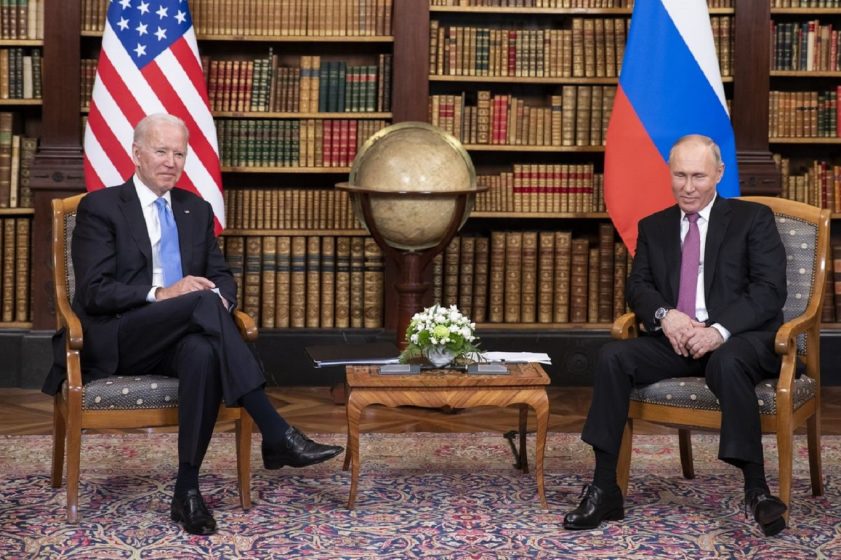
Andrew Korybko
US President Joe Biden scandalously quipped throughout Wednesday’s interview that NATO may be divided over how to respond on the occasion that Russia phases a so-called “minor attack” into Ukraine.
This exposes that his group’s technique towards Russia isn’t completely formed in the context of the undeclared US-provoked rocket crisisin Europe that talks previously this month were focused on de-escalating.
It also follows speculation from American intelligence agencies that the Eurasian Great Power is preparing a “incorrect flag” attack in Donbass in order to validate using force against its next-door neighbor, which Moscow of course angrily denied.
That claim prompted an Eastern Ukrainian militia leader to far more credibly allegethat it’s actually British-trained Ukrainian operatives who are plotting a false flag attack there.
It’s objectively the case that tensions are soaring in between the United States and Russia as an outcome of recent talks failing to achieve legal guaranteesfor the latter’s security. In particular, Moscow is requesting that NATO officially state that it will not broaden any more eastward and that it also will not release strike weapons near Russia’s borders.
The Kremlin also requested composed replies to all of its extremely detailed proposals that its representatives just recently gone over with their American counterparts. While the anti-Chinese faction of the US’ long-term armed force, intelligence, and diplomatic bureaucracies (“deep state”) has an interest in de-escalating stress in Europe so as to make it possible for the Pentagon to redeploy a few of their forces from there to the Asia-Pacific in order to more strongly “consist of” China, their anti-Russian rivals disagree.
That subversive factionhas seemingly prospered in at the very least delaying progress on that front, if not alarmingly risking its reversal towards a lot more heightened competition between these nuclear powers.
There’s likewise an important domestic political context that’s just recently entered play too, and that’s the Biden Administration’s newest spree of legal losses on the house front.
Some hypothesize that the incumbent’s group might try to provoke a global interruption that they may incorrectly believe could be “manageable” in order to rally the nation behind its senior leader. The timing is such that this could proverbially “kill two birds with one stone” by triggering the fearmongered “minor incursion” by Russia throughout next month’s Beijing Winter season Olympics in order to spoil that latter event.
Strategically speaking, this is ominously similar to what the United States did during the 2008 Beijing Summertimes Olympics when it motivated previous Georgian President Saakashvili to provoke a similar “minor attack” by assaulting Russian peacekeepers in South Ossetia during the start of those Games. History may when again be repeating itself for those self-serving reasons.
Much like back then, the United States thought that any kinetic proxy crisis with Russia would be “manageable” but the outcome shattered their expectations. So too might something similar take place vis-à-vis Ukraine since any “small incursion” by Russia would likely be focused on totally reducing the effects of the military danger to its national security from that neighboring country. To put it simply, the United States would suffer a massive strategic obstacle.
Nonetheless, depending upon the scope and scale of the fearmongered “small attack” that may be triggered by the US’ anti-Russian “deep state” faction either encouraging Kiev to start a 3rd round of Civil War hostilities in Eastern Ukraine and/or unthinkably attack Russian forces across the border straight, the US-led West may or might not impose its threatened worst-ever sanctions programversus Moscow.
In theory, artillery and rocket strikes from within Russia’s own borders against hostile Ukrainian military targets might be adequate to reduce the effects of impending threats without its forces having to cross the global frontier. That might allow Russia to react below the sanctions limit while still accidentally ruining the Beijing Winter Olympics like the US may be hoping.
It would also suffice to provoke the foreign crisis that Biden’s group might have precariously convinced themselves that he requires for domestic political factors associated with sidetracking Americans from his unsuccessful legislative program and getting them to rally behind him on a so-called “patriotic” pretext.
Depending on how the sequence of occasions is spun to average Americans, it might also potentially provide the Democrats a combating possibility ahead of the midterm elections later this year. It’s admittedly a gamble, but as the saying goes, “desperate individuals do desperate things” and the Biden Administration is ending up being progressively desperate as a result of its most current legal obstacles.
The “minor attack” that their anti-Russian “deep state” faction may be plotting to provoke might for that reason be seen as a practical scenario.
Observers should bear in mind that while the insight shared in this analysis makes sense from the point of view through which the author has actually lately been interpreting the US’ method towards Russia’s security warranties, anything can still occur considering that its “deep state” dynamics stay nontransparent by their very nature.
This indicates that the “minor incursion” scenario may not really occurred if something changes behind the scenes and thus modifies its “deep state’s” estimations. It’s clear that the Biden Administration stays divided over what to do however that some members within it are alarmingly flirting with the possibility of provoking what they mistakenly believe might be a “workable crisis” with Russia.
The next 4 weeks till the upcoming Olympics’ closing event on 20 February will be informing.


